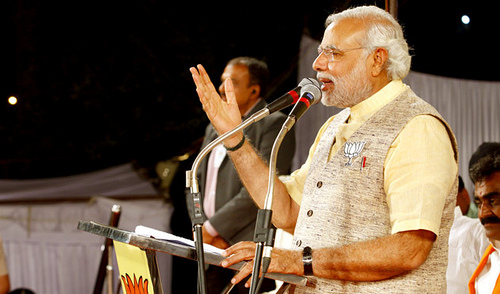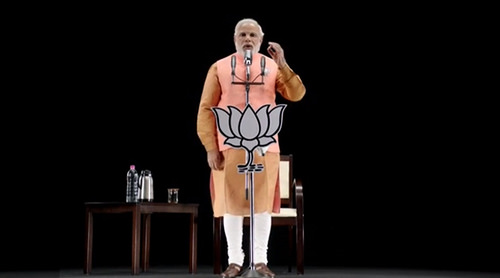
The elections in Bihar once again signalled at the electoral rejection of emotive Hindutva issues as RJD-JD(U)-Congress combine emerged victorious despite intense campaigning by Prime Minister Narendra Modi. (Image: PTI)
The electoral victory of the mahagathbandhan in Bihar has come as a big boost for Lalu Prasad Yadav who was on the verge of political extinction. By emerging as the single largest party, Rashtriya Janata Dal (RJD) has successfully exhibited its popularity among Biharis. What is astonishing is that Lalu’s popularity has risen despite his conviction by a CBI court in the fodder scam.
On the other hand, Nitish Kumar of Janata Dal United or JD (U) has won for himself a third term as Chief Minister of Bihar. Along with the likes of Arvind Kejriwal, Mulayam Singh Yadav, Mamata Banerjee, Jayalalitha and Naveen Patnaik, Nitish Kumar is sure to be touted as the one of ablest men to lead a third front assault on the two national parties, particularly the BJP, in the times to come.
However, the most interesting take away from the landslide victory of RJD-JD(U)-Congress combine is the continuing trend of decisive mandates. Post 2012, states like Uttar Pradesh, Tamil Nadu, Kolkata, Madhya Pradesh, Odisha, Maharashtra, and now Bihar, have overwhelmingly voted in favour of a particular party or coalition. The general elections in 2014 too exhibited a similar pattern. The notable exceptions to this phenomenon were Delhi and Jammu & Kashmir.
In 2013, Aam Aadmi Party (AAP) fought elections for the first time turning battlefield Delhi into a triangular contest between BJP, Congress and AAP. This led to AAP and BJP narrowly missing out on the magic number and what followed next was a short lived Congress supported AAP government. Thereafter, when elections were held again in early 2015, the verdict of Delhi-walas was entirely one sided and brought AAP absolute majority.
As far as Jammu and Kashmir elections of 2014 are concerned, though the verdict was split, it was clear that the People’s Democratic Party (PDP) was the chosen one in the valley while the BJP comfortably led in the region of Jammu. That way the election result was again decisive in nature and led to the formation of a coalition government comprising of PDP and BJP. Despite the confusion in the minds of pollsters and psephologists, the voter is acting very cleverly. The exit polls might predict a khichdi verdict or neck to neck competition but the voters are throwing up a clear mandate.
Secondly, the elections in Bihar once again signalled at the electoral rejection of emotive Hindutva issues. The voters in Uttar Pradesh rejected the false bogey of live jihad during the by-elections held in the state last year. The national capital voted against ghar wapsi and attacks on churches in February this year. Finally Bihar has voted against beef politics and fear mongering in the name of carving a religion based minority sub quota out of the reservation pie of Other Backward Castes or OBCs.
The writing on the wall is becoming increasingly clear for the BJP. It is time to perform or perish. The Prime Minister can manage any number of events, undertake as many foreign trips as he wishes to and campaign as vigorously as possible but if his government doesn’t deliver in terms of poverty alleviation, job creation and income equality, the electorate is going to show his party the door. The voter cannot be fooled simply on the basis of Hindutva and rhetoric.
When BJP lost in Delhi, the blame was shifted towards Kiran Bedi as she happened to be the party’s chief ministerial candidate. The same cannot be done in the case of Bihar as the BJP fielded no chief ministerial candidate with Modi being the outright leader. Even in Delhi, it was Modi who led the campaign all through but his failure was conveniently set aside. Modi is based out of Delhi. He along with his entire cabinet campaigned in Delhi yet they lost.
Prime Minister Modi left African leaders in Delhi to campaign in Bihar yet BJP lost. The lesson which is to be learnt is that Modi can be overcome electorally with the help of strong local leaders like Kejriwal, Nitish and Lalu. BJP must realize that it cannot always piggybank on Modi’s supposed PAN-India popularity. There is a dire need for cultivation of popular local leaders like Shivraj Singh Chauhan in Madhya Pradesh, Raman Singh in Chhattisgarh and Vasundhara Raje in Rajasthan.
Another observation is that no matter what is proclaimed from 24 Akbar Road, Congress is on the decline. They drew a blank in Delhi but have performed reasonably well in Bihar. However, their vote share remains in single digit and the party is far from being the nationwide force it once used to be. If INC has chosen to eternally play second fiddle to the likes of JD(U), RJD and AAP then its altogether an entirely different story.
Politics in the country is becoming all the more BJP-centric. The vote in Bihar was against the BJP government at the centre as also against Hindutva. Those who are rushing and labelling the verdict as a victory of development oriented politics need to do a rethink. Lalu’s campaign rhetoric was less about development and more about a “battle between forward and backward castes.” Nitish’s masterstroke was in aligning with his bête noire Lalu to oust the BJP instead of holding a referendum on his ten year rule by going solo.
If Kejriwal won Delhi on the basis of populist politics, Lalu and Nitish have won Bihar by carving an alliance which none saw coming. It’s a triumph of complex caste arithmetic over Hindutva superimposition. The much talked about development politics had little relevance with both sides banking heavily on identity politics. The blunders committed in Bihar by the BJP should be carefully scrutinized but Lalu’s comeback in Bihar exemplifies that caste still lords over Bihar’s election castle. Modi sarkaar has indeed failed in fulfilling its tall promises but where was the vision of “maha gathbandhan” during Bihar elections? The people seem to have chosen the one whom they viewed as the “lesser evil”.
(This article was originally published in DailyO.)



